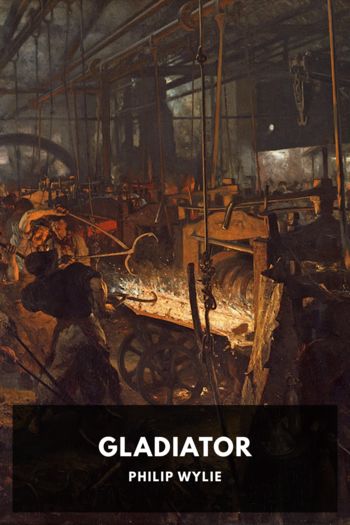Gladiator - Philip Wylie (readnow .TXT) 📗

- Author: Philip Wylie
Book online «Gladiator - Philip Wylie (readnow .TXT) 📗». Author Philip Wylie
It began in the early morning when the anchor of the freighter thundered into the harbour water. The crew was not given shore leave until noon. Then the mysterious silence of the captain and the change in the ship’s course was explained. Through the third officer he sent a message to the seamen. War had been declared. The seaways were unsafe. The Katrina would remain indefinitely at Marseilles. The men could go ashore. They would report on the following day.
The first announcement of the word sent Hugo’s blood racing. War! What war? With whom? Why? Was America in it, or interested in it? He stepped ashore and hurried into the city. The populace was in feverish excitement. Soldiers were everywhere, as if they had sprung up magically like the seed of the dragon. Hugo walked through street after street in the furious heat. He bought a paper and read the French accounts of mobilizations, of a battle impending. He looked everywhere for someone who could tell him. Twice he approached the American Consulate, but it was jammed with frantic and frightened people who were trying only to get away. Hugo’s ambition, growing in him like a fire, was in the opposite direction. War! And he was Hugo Danner!
He sat at a café toward the middle of the afternoon. He was so excited by the contagion in his veins that he scarcely thrilled at the first use of his new and half-mastered tongue. The garçon hurried to his table.
“De la bière,” Hugo said.
The waiter asked a question which Hugo could not understand, so he repeated his order in the universal language of measurement of a large glass by his hands. The waiter nodded. Hugo took his beer and stared out at the people. They hurried along the sidewalk, brushing the table at which he sat. They called to each other, laughed, cried sometimes, and shook hands over and over. “La guerre” was on every tongue. Old men gestured the directions of battles. Young men, a little more serious perhaps, and often very drunk, were rushing into uniform as order followed order for mobilization. And there were girls, thousands of them, walking with the young men.
Hugo wanted to be in it. He was startled by the impact of that desire. All the ferocity of him, all the unleashed wish to rend and kill, was blazing in his soul. But it was a subtle conflagration, which urged him in terms of duty, in words that spoke of the war as his one perfect opportunity to put himself to a use worthy of his gift. A war. In a war what would hold him, what would be superior to him, who could resist him? He swallowed glass after glass of the brackish beer, quenching a mighty thirst and firing a mightier ambition. He saw himself charging into battle, fighting till his ammunition was gone, till his bayonet broke; and then turning like a Titan and doing monster deeds with bare hands. And teeth.
Bands played and feet marched. His blood rose to a boiling-point. A Frenchman flung himself at Hugo’s table. “And you—why aren’t you a soldier?”
“I will be,” Hugo replied.
“Bravo! We shall revenge ourselves.” The man gulped a glass of wine, slapped Hugo’s shoulder, and was gone. Then a girl talked to Hugo. Then another man.
Hugo dwelt on the politics of the war and its sociology only in the most perfunctory manner. It was time the imperialistic ambitions of the Central Powers were ended. A war was inevitable for that purpose. France and England had been attacked. They were defending themselves. He would assist them. Even the problem of citizenship and the tangle of red tape his enlistment might involve did not impress him. He could see the field of battle and hear the roar of guns, a picture conjured up by his knowledge of the old wars. What a soldier he would be!
While his mind was still leaping and throbbing and his head was whirling, darkness descended. He would give away his life, do his duty and a hundred times more than his duty. Here was the thing that was intended for him, the weapon forged for his hand, the task designed for his undertaking. War. In war he could bring to a full fruition the majesty of his strength. No need to fear it there, no need to be ashamed of it. He felt himself almost the Messiah of war, the man created at the precise instant he was required. His call to serve was sounding in his ears. And the bands played.
The chaos did not diminish at night, but, rather, it increased. He went with milling crowds to a bulletin board. The Germans had commenced to move. They had entered Belgium in violation of treaties long held sacred. Belgium was resisting and Liége was shaking at the devastation of the great howitzers. A terrible crime. Hugo shook with the rage of the crowd. The first outrages and violations, highly magnified, were reported. The blond beast would have to be broken.
“God damn,” a voice drawled at Hugo’s side. He turned. A tall, lean man stood there, a man who was unquestionably American. Hugo spoke in instant excitement.
“There sure is hell to pay.”
The man turned his head and saw Hugo. He stared at him rather superciliously, at his slightly seedy clothes and his strong, unusual face. “American?”
“Yeah.”
“Let’s have a drink.”
They separated themselves from the mob and went to a crowded café. The man sat down and Hugo took a chair at his side. “As you put it,” the man said, “there is hell to pay. Let’s drink on the payment.”
Hugo felt in him a certain aloofness, a detachment that checked his desire to throw himself into flamboyant conversation. “My name’s





Comments (0)